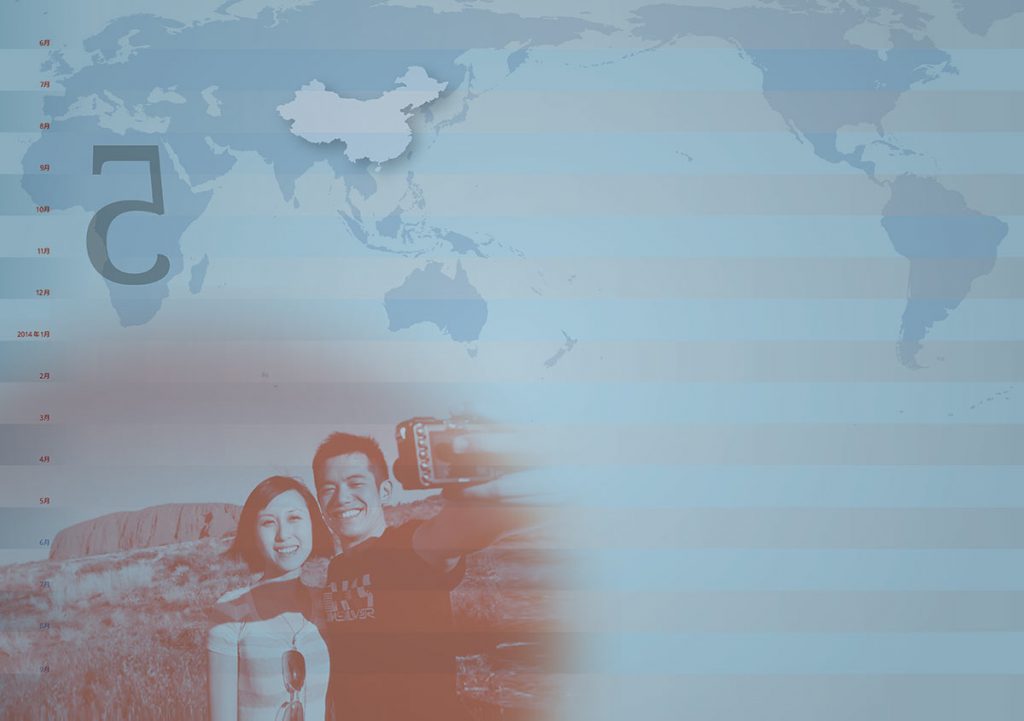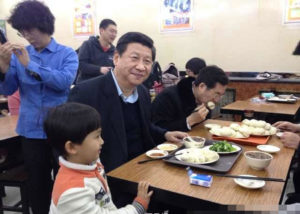PEOPLE IN URBAN China travel, move house and commute longer distances than ever before. They also enjoy greater opportunities to change their lifestyles or move up the social ladder. The gradual removal of historical bans imposed by the Communist Party on unauthorised movement between cities (or from the countryside to the city) as well as owning property and travelling abroad make the ease of movement — mobility — novel and exciting.
Over the past year and a half, the anti-corruption campaign has identified ‘excessive mobility’, as defined by all forms of ‘extravagance’ 铺张 or 奢靡 on the part of party and government officials, as being a danger to the wellbeing of the party-state. New prohibitions and regulations have put pressure on party and government officials to change their habits, alter their lifestyles and abandon any plans to establish a residential base overseas — in effect, to retreat from the Zeitgeist of mobility. This chapter considers the implications for the Shared Destiny of the Chinese in the context of movement between China and the world, particularly in relation to the Party’s seemingly stringent anti-waste regulations.
A New Austerity
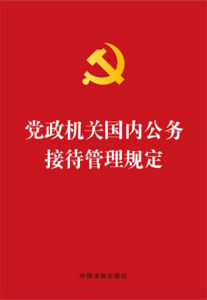
Rules on Party and Government Domestic Official Business Reception Management Photo: xinxi1.yymcc.com
In November 2013, the Third Plenary Session of the Eighteenth Party Central Committee approved what are formally known as ‘Party and Government Regulations for Strict Economic Practices to Combat Waste’ 党政机关厉行节约反对浪费条例. The regulations, divided into twelve chapters and covering sixty-five items, outlined in great detail the management of government funds for everything from official travel, receptions and meetings to the use of vehicles and the renovation or construction of public buildings. This was the fourth tranche of bans and regulations issued since 2012 aimed at reforming and remoulding official conduct. They complemented and extended the ‘Twenty-six Item Directive’ or ‘Rules on Party and Government Domestic Official Business Reception Management’ 党政机关国内公务接待管理规定 of December 2013; the January 2013 stipulations known as the ‘Cage of Regulations’ 制度的笼子; and, the December 2012 ‘Eight Rules on Official Behaviour’ 八项规定 that were a feature of China Story Yearbook 2013.
The new raft of regulations prescribed correct practices in mind-numbing detail and highlighted existing problems of official conduct. They targeted lavish dining out, banquets and receptions, gift-giving, publically funded travel and the perks that go with it. The prescriptions (and proscriptions) in each and every category will slow down growth in the urban economy, especially the service industries, such as restaurants and hotels, as well as the urban environment and the experience of living in Chinese cities more generally.
Among other things, the regulations specifically prohibited: bribery in all forms, including accepting expensive gifts; hiding illegally obtained income; misusing government funds; charging non-official fees and tourism in the guise of official travel. They ban local initiatives including celebrations of local culture and the manufacture of products that have not been approved by higher authorities. They also proscribe non-approved changes to the administrative divisions, that is, the subnational boundaries, of governing districts. They demand that officials vacate non-standard office spaces, including long-term leases in hotels, and ban the construction of large and lavish new offices. Moreover, local governments must not, as they have taken to doing on a grand scale, build flash new urban landmarks 城市地标 or large-scale plazas.
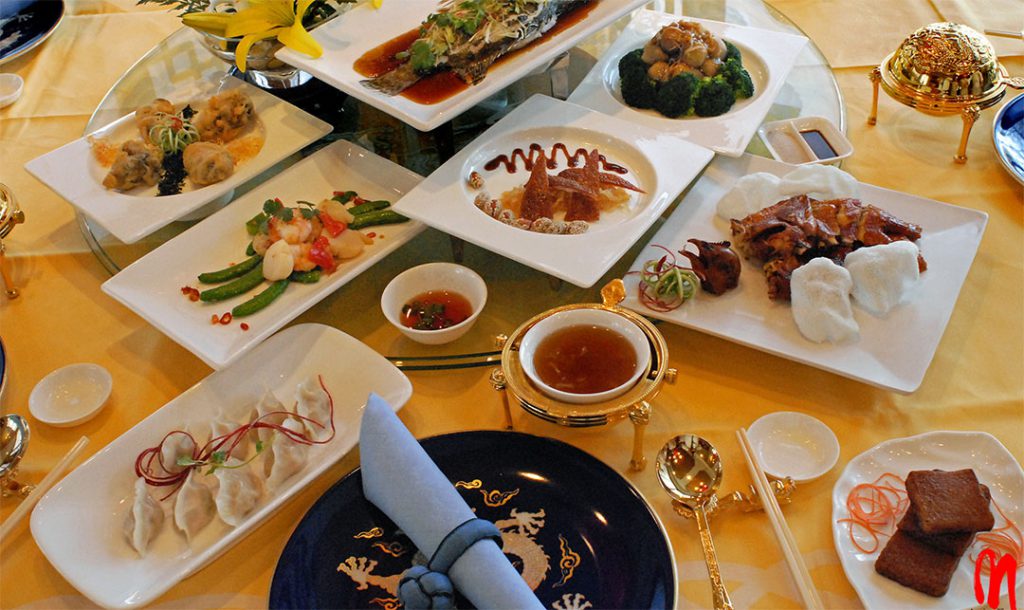
The newly approved ‘Party and Government Regulations for Strict Economic Practices to Combat Waste’ forbade lavish dining out, banquets and receptions, gift-giving, publically funded travel and the perks that go with it
Photo: Frank Müller/Flickr
The regulations promote budget restraint, rigorous audit practices, market price-based expenditure, the market reform of official vehicle procurement, and a two-tier, central and provincial-level approval process for related decisions that had previously only needed to be approved locally. They encourage the conservation of energy and resources, including of equipment and furnishings — no need to update computer laptops to the latest model or redecorate for no good reason. Government bureaus should adopt the ‘paperless office’ and co-ordinate to prevent duplication of functions. Propaganda or party PR departments must ‘promote the concept of green, low-carbon consumption and a healthy and civilised lifestyle’ 倡导绿色低碳消费理念和健康文明生活方式. The Party will conduct on-site disciplinary inspections — including unannounced or spontaneous inspections — and investigate tips received from the public regarding official breaches of these published rules and regulations.
Yet contradictions abound. On the one hand, the anti-corruption campaign purports to promote market competition, which means that the state should not control production and that entrepreneurs should be free to establish businesses small or large. On the other hand, it demands the standardisation of consumption practices at all levels of society. It strengthens the visible hand of the Party while simultaneously encouraging and frustrating the less visible hand of the market.
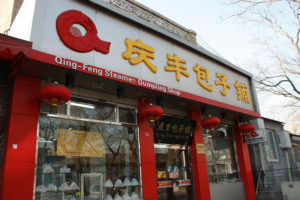
In December 2013, Xi Jinping took his austerity program into the streets, eating at the Qingfeng Steamed Bun Outlet in Beijing’s Chaoyang district, one in a chain of such restaurants
Photo: Weibo
The anti-waste campaign seeks to curb dining out on the public purse. Article Twelve of the ‘Twenty-six Item Directive’ prohibits the consumption of shark fins, birds’ nests and endangered animals, as well as spending government funds on cigarettes and liquor. The campaign also targets consumption that is beyond the public gaze, banning officials from frequenting or belonging to private clubs (see the China Story Yearbook 2013: Civilising China, Information Window ‘Bathtime: Clamping Down on Corruption’, p.104). Inspectors have identified upscale private clubs and restaurants in public parks and heritage sites for closure and corrective action. In January 2014, the Beijing Municipal Government listed twenty-four such clubs and restaurants operating in public parks, some in dynastic-era heritage buildings, including in Beihai Park in central Beijing. It ordered them to suspend business and ‘adjust their way of thinking’ 调整思路. The Hangzhou West Lake government also ordered luxury restaurants to close or develop new business models with moderately priced menus.
In December 2013, Xi Jinping took his austerity program into the streets, eating at the Qingfeng Steamed Bun Outlet 庆丰包子铺 in Beijing’s Chaoyang district. He appeared to have arrived alone, ordered at the counter, paid twenty-one yuan (US$3.50) for the meal and carried his tray to a table. Following his visit, to which the official media gave much publicity, customers flocked to the restaurant to order the ‘Chairman’s Combo’ 主席套餐, a value meal of six steamed buns, a cold green vegetable and a soup of pig’s liver and intestines. The owner, concerned with crushing competition for ‘Xi’s Seat’, removed the table at which he sat as if it were an iconic object.
Yet if the image of Xi eating at the Qingfeng Steamed Bun Outlet seems to support small-scale entrepreneurs in the market economy, the reality is somewhat different. The Qingfeng chain is a subsidiary of the Huatian Group, a state-owned conglomerate that was co-founded by Beijing’s Xicheng District Government and the State-owned Assets Supervision and Administration Commission of the State Council. The complex relationship between the state and the market results in many such examples in which private enterprise and state ownership coexist. For example, when corporations, not official bodies, sponsor banquets, the anti-waste regulations don’t apply — yet the corporation itself may well be wholly or jointly state-owned.
Curbing Excess at Home but Not Abroad?
While aimed at bolstering the Party’s legitimacy with the people and targeting official waste and corruption, the austerity campaign has also affected the relationships between political and economic elites, who together set trends in the urban consumer economy through their social relations and exchanges of favours.
Just two years ago many foreign luxury firms had planned to expand their businesses widely in China. But sales for international brands began to decrease in 2013 and by 2014 some luxury malls and international brand shops in Shanghai and Beijing had become consumer deserts. Although luxury brands continue to boost their profiles with bullish retail promotions and press releases, there is no doubt that conspicuous consumption has decreased as a result of the austerity campaign.
Yet by the first quarter of 2014, as global firms tracking luxury brands reported decreased sales in China, they noted that consumption of luxury goods by Chinese tourists overseas actually increased. In 2014, France, the home of many luxury brands, became the most favoured destination for middle-class Chinese tourists. It had already been high on the list of China’s wealthy, measured as the top wealthiest twenty-five percent of the country’s outbound tourists by income, who prefer it second only to Australia, where the clean environment is the main draw.
Having seen Paris, some wealthy Chinese tourists took to pursuing the red wines of Bordeaux and Burgundy to the source, visiting the great chateaux and buying wine, or even whole cellars. Other travellers, led predominantly by women, would head south to seek out the fabled colours of Provence. These regional landscapes — from the Route des Grands Cru, Dijon to Santenay, to the lavender fields of Aix-en-Provence — have become widely known and even reproduced in China.

Zhang Xinyu posted a photo of herself with a lavender-coloured plush bear from a lavender estate in Tasmania. Chinese tourists descended on the town en masse to snap up the same bear
Photo: Zhang Xinyu/Weibo
After the fashion model Zhang Xinyu 张馨予 posted a photo of herself with a lavender-stuffed, lavender-coloured plush bear from a lavender estate in Nabowla, Tasmania (the south-eastern island state of Australia), Chinese tourists descended on the town en masse to snap up the same bear — originally created as a way to deal with excess lavender. The demand grew so intense that the lavender estate limited sales to one per person. Even a Chinese quarantine services ban on the bear failed to have any immediate effect on sales.
Chinese citizens first gained the opportunity to travel outside the Mainland in the 1980s. In 1983, Hong Kong and Macao became the first places opened to Chinese tourists, but they could only travel as part of an organised tour. In 2003, in response to the SARS (Severe Acute Respiratory Syndrome, or ‘avian flu’) crisis, which caused a meltdown in Hong Kong’s tourism industry and put many businesses in peril, Hong Kong implemented an ‘individual visitor scheme’ to boost mainland tourism. China’s middle class shoppers, discouraged from buying quality goods and luxury brand products in China because import duties and consumption taxes had made them far too expensive, found the same goods in Hong Kong’s shopping malls — tax free. If the individual visitor scheme introduced new possibilities for travel and consumption, it was a privilege that was unevenly distributed. Just as the first economic experiments of Deng Xiaoping’s program of Reform and Opening Up were first trialled in the Special Economic Zones of Shenzhen in the south before being extended to coastal cities and finally interior provinces, from south to north and east to west, the individual visitor scheme initially allowed independent travel only to residents of certain places in Guangdong. Later, this was extended to Beijing and Shanghai. Shenzhen, on the Hong Kong border, was able uniquely to offer multiple-entry visas for Hong Kong beginning in 2009.
During this time, the government gradually relaxed restrictions on travel by Chinese nationals to other countries. Through the 1990s, ‘approved destinations’ were confined to the Asia and Pacific region, with Australia and New Zealand being added to the list in 1999. Most European countries became approved destinations in 2004–2005, the United States in 2008 (by which time there were ninety-five countries on the list) and Canada in 2010. In 2013, Rwanda became the 116th country to make the list.
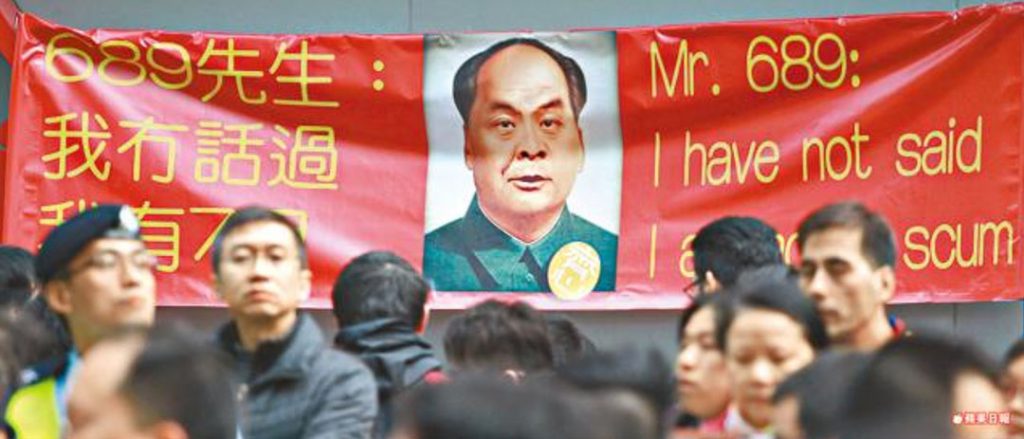
‘Mr. 689’ is the nickname Hong Kongers have given CY Leung, installed as Chief Executive of Hong Kong in 2012 with 689 votes by China’s elite electoral committee. It became the unoffical symbol of the Hong Kong protests in 2014
Photo: hk.apple.nextmedia.com
Exceptional Zones: Hong Kong and Macao
While mainland Chinese tourists boost the economies of their destinations, their arrival has not always been greeted with joy. In January 2014, the Hong Kong Secretary for Commerce and Development Gregory So Kam-leung 蘇錦樑 sparked public consternation when he claimed that Hong Kong, an urban area with a population of 7.2 million, could receive as many as seventy million tourists annually within three years, and up to one hundred million by 2023. In 2013, 40.8 million of the year’s annual 54.3 million visitors arriving in Hong Kong came from mainland China.
There had already been both media criticism of and protests against Mainlanders (‘locusts’) for the bad manners that some displayed and the negative impact of mainland tourism in general (see the China Story Yearbook 2013: Civilising China, Forum ‘Civilised Tourism’, p.14). In March 2014, a particularly theatrical protest saw about one hundred people wearing Cultural Revolution-style costumes, waving red flags and holding posters with the Hong Kong Chief Executive CY Leung’s 梁振英 face ‘photoshopped’ onto Mao Zedong’s body as they shouted slogans like ‘Love your country — buy Chinese products’ 愛國愛國貨. In response to this popular backlash, in May 2014, the New China News Agency published a list of ‘do’s and don’ts’ for Mainlanders planning a visit to Hong Kong. The introduction to these guidelines reminded travellers that, ‘when you go somewhere, follow local custom’ 入乡随俗, elaborating on differences in daily life between the Mainland and Hong Kong.
Another concern is economic. In March 2014, The Economist named Hong Kong number one on its new ‘crony-capitalism index’, by a wide margin. The index tracks economic activity susceptible to ‘rent-seeking’, which it defines as ‘grabbing a bigger slice of the pie rather than making the pie bigger’, and which often involves businesses gaining advantages over competitors as a result of political connections. It cites both Hong Kong and Singapore for their ‘role as entrepôt for shiftier neighbours’.
Local authorities are also concerned about mainland visitors engaging in practices aimed at circumventing Chinese law, including the anti-waste regulations and the anti-corruption campaign. Some visitors make fraudulent use of UnionPay cards to circumvent Chinese laws restricting the amount of foreign currency a citizen can legally take out of the country. UnionPay is China’s only domestic bankcard. It is used by all banks in China and operates with the approval of the People’s Bank of China. It is widely accepted by ATMs in Hong Kong and Macao.
In 2006, Macao beat Las Vegas to take the title of biggest gambling centre in the world. By 2013, official figures for gaming revenue in Macao reached an unprecedented US$45 billion. But an estimated further US$90 billion in unreported income, twice the official total, came from the illegal use of UnionPay cards. The most common ruse is to pay for jewellery or other luxuries via UnionPay and then return the items for cash. The second type of fraud involves the use of handheld UnionPay terminals registered on the Mainland and smuggled into Macao in order to record transactions as domestic.
In May 2014, the unprecedented growth of UnionPay card use in Macao raised concerns in Beijing that, as reported by the Macau Business Daily, ‘tens of billions of yuan in illicit funds are being funnelled out of the Mainland and into casinos in direct contravention of national currency controls’. UnionPay quickly announced measures to ‘combat overseas money laundering [and] capital flight’. The Macao Monetary Authority ordered casinos and shopping malls to search out and remove all unregistered UnionPay card machines. Subsequent media reports indicate that mainland visitors still commonly use UnionPay in Macao, but casinos and shops have not been able to add new payment terminals and there is ongoing official scrutiny.
Globalisation of Capital and Residency Schemes
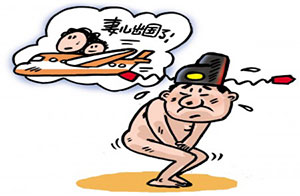
‘Naked officials’: Party and government officials who send their families and suspicious fortunes to Hong Kong or Western countries, including tax havens with no extradition treaty with China, without a legitimate work-related reason
Photo: Weibo
Ever since the Global Financial Crisis of 2007–2008, well-heeled Chinese have invested in the housing market in many of the world’s most desirable cities. Wealthy investors ‘rationally overpay’ to park capital in real estate that then routinely lies vacant. The decision to invest in property overseas is not surprising. In China, property reverts to the state after seventy years; there is no such thing as ownership in perpetuity. According to the global real estate services firm Jones Lang LaSalle, Chinese investment in real estate abroad increased by twenty-five percent in the first quarter of 2014 over the previous year to a total of US$2.1 billion.
Among the most popular cities with cashed-up Chinese investors are those where housing is the least affordable: Hong Kong, Vancouver, Sydney, San Francisco, San Jose (Silicon Valley), Melbourne, New York, London, Los Angeles and Auckland. As a result, in many of these cities there is concern that Chinese investment is pushing housing prices out of the reach of local residents. In February 2014, Canada cancelled its Immigrant Investment Program, which had some 65,000 pending applications, seventy percent of which were from China, claiming that the scheme had under-valued Canadian permanent residency.
In Australia, there have been conflicting reports on the impact of foreign investment, of which Chinese investment is a significant part, on the real estate market. The law holds that non-residents are allowed to purchase only new-build housing (thus stimulating construction), while some figures suggest that non-resident purchases also factors in the 15.4 percent rise in housing prices in Sydney and 9.2 percent rise in Melbourne over the twelve months to June 2014. A parliamentary inquiry into the effect of foreign buyers on Australian real estate prices has suggested new rules and stricter enforcement of existing rules, while reported reactions among ‘cashed-up foreign real estate investors view the existing $85,000 fine for buying existing dwellings just a cost of doing business’.
A financial industry survey found that forty-seven percent of ‘high net worth’ individuals planned to move overseas. From the standpoint of those running the anti-corruption campaign, the problem is that Chinese investing overseas includes government officials whose incomes should not allow it. A survey by the Chinese Academy of Social Sciences revealed that half of the party and government officials at provincial and county levels were considering how to acquire foreign nationality or residency for their children. Bureaucrats whose spouses, children — and assets — have been moved abroad are called ‘naked officials’ 裸体官员, known colloquially as luoguan 裸官 (see Forum ‘Chinese Families Going Global?’, p.230). According to the Global Financial Integrity Group, which monitors illegal money flows, no less than US$3 trillion had been illicitly spirited out of China in the six years to 2011.
In a 2013 speech on the drive for clean government (‘honest and clean party and government rule’ 党风廉政), Wang Qishan, head of the Central Commission for Discipline Inspection, previewed measures to bring China’s 1.18 million ‘naked officials’ into line. Wang identified how the problem of nepotism, like all forms of corruption, interferes with the development and operation of the market. But his observation exposes the contradiction between party-state expectations for political elites and the rational choices individuals make in the global market.
The Hong Kong Capital Investment Entrance Scheme bars applicants from China but makes an exception for Chinese nationals who have permanent residence in another country. For a fee of HK$200,000 (US$25,800) Hong Kong immigration agents help mainland citizens obtain residency permits in other countries with lax requirements for residency so that they can take advantage of this loophole. Of more than 17,000 mainland Chinese investors in the Hong Kong scheme, a group that constitutes eighty-seven percent of the total, 13,300 have residency papers from Gambia and Guinea-Bissau. In the third quarter of 2013, applicants for Hong Kong’s program more than doubled from the previous year to 3,380, a record high. Officials from the People’s Republic may apply with civilian mainland identity cards while maintaining household registration status and businesses in China.
Applications from mainland students to Hong Kong universities have also increased significantly, including applications from mature-age students. In the 2010s, the proportion of postgraduate students from mainland China studying at Hong Kong universities increased to more than half. In the academic year 2011–2012, out of fewer than 7,000 postgraduate students at Hong Kong universities, 4,298 were from China. By 2012–2013, the number increased to 4,586. Most pursue master’s programs in business, finance, accountancy and other professional degrees. The postgraduate visa is a more economical way to obtain Hong Kong residency than the capital investment scheme. It allows graduates one year to find a job and, after another six years, the opportunity to apply for permanent residency.
After Canada cancelled its popular (and relatively low-cost) Immigrant Investment Program, similar schemes in Australia, Europe and the US became even more popular. In November 2012, Australia introduced the Significant Investor Visa, which mandated an investment of AU$5 million in a local business or approved managed funds for those who would want to obtain permanent residency. Within a year, eighty-five percent of the applications came from mainland Chinese. In October 2014, the Australian government went even further, announcing a new ‘premium’ investor visa for applicants investing AU$15 million or more in the country, who can then get permanent residence in one year.
In Europe, the direct purchase of real estate entitles the buyer to resident status in Portugal, Spain, Greece and Cyprus. In 2012, Portugal introduced a ‘318 Golden Visa’; this allows the granting of permanent residency after five years and EU residency after an additional one year for buyers of real estate with a value greater than €500,000. In the first year, 248 of 400 successful applicants came from China.
In August 2014, the US State Department announced that the annual quota of investment visas for permanent residency in the United States had filled early, with Chinese investors making up eighty percent of the year’s allocation. Demand from China for the US scheme exceeds that from any other county, and it increased after Canada shut down its program.
Conclusion
When the Party launches a political campaign, superficial or at least statistically evident results can be quick. But such campaigns have historically played out only in China itself. The current austerity campaign has implications for the behaviour of Chinese elites and officials in a global context. In October 2014, the Australian Federal Police revealed they were working with their Chinese counterparts to seize the assets of corrupt officials who had brought hundreds of millions of dollars of illicit earnings into Australia.
How will political and economic elites react to the new pressures for clean government in relation to the way they take up global opportunities? How will regulations set by the Party work in an era of international capital mobility? What are their implications for national loyalties, food security and environmental quality at home and abroad?
As noted elsewhere in this volume, the anti-corruption campaign ostensibly sought to clear the way for the implementation of a new wave of economic reforms. Its anti-waste directives expose and address popular outrage at official corruption and excess consumption. But it also reveals fundamental contradictions in a political-economic system in which the state embraces market discourses and desires rather than focusing on the establishment and long-term maintenance of viable market institutions. The political campaign is unlikely to be able to rein in the new urban mobility.
Domestic and international mobility in China has increased dramatically over the past thirty years. The impending loosening and reform of the once-strict household registration system will grant legal residency status to millions of urban migrants; it will address the problems of the urban underclass and increase their potential for social mobility in China’s burgeoning cities. At the same time, urban professionals are growing anxious about the future in which they share social welfare with millions of new urban citizens. New constellations of mobility make the cities of the outside world, by comparison, desirable and realistic destinations and sites of comparative possibility. The Shared Destiny of groups and classes in China extends their desire to embrace a global destiny — the ramifications of which are hard to predict.
Notes
‘Party and government regulations for strict economic practices to combat waste (党政机关厉行节约反对浪费条例)’, Xinhua, 25 November 2013, online at: http://news.xinhuanet.com/politics/2013-11/25/c_118287949.htm
‘Rules on Party and government domestic official business reception management 党政机关国内公务接待管理规定’, Xinhua, 8 December 2013; online at: http://news.xinhuanet.com/politics/2013-12/08/c_118467426.htm; the ‘cage of regulations’ 制度的笼子, January 2013; and the ‘eight rules on official behaviour’ 八项规定, December 2012.
北海公園乙十六餐廳:整改后降價面向大眾 (Yishiliu restaurant in Beihai Park: reduced prices for the general public after corrective action), The Beijing News 新京報, 16 January 2014, online at: http://finance.people.com.cn/BIG5/n/2014/0116/c70846-24138313.html
‘庆丰包子铺“主席套餐”受热捧’ (Qingfeng steamed bun shop ‘Chairman’s combo’ has become a hit), 新良图片, 29 December 2013, online at: http://slide.news.sina.com.cn/c/slide_1_2841_39374.html#p=1
Liu Lian, ‘Is the shine gone from luxury goods?’, China Daily Asia, 19 February 2014, online at: http://www.chinadailyasia.com/business/2014-02/19/content_15119218.html
Claudio D’Arpizio, ‘Luxury goods worldwide market study spring 2014’, Bain & Company, 19 May 2014, online at: http://www.bain.com/publications/articles/luxury-goods-worldwide-market-study-spring-2014.aspx
Bernice Chan, ‘Anger towards mainland visitors likely to worsen unless problems addressed’, South China Morning Post, 25 April 2014, online at: http://www.scmp.com/lifestyle/travel/article/1495953/anger-towards-mainland-visitors-likely-worsen-unless-problems
‘Planet plutocrat: our crony capitalism index’, The Economist, 15 March 2014, online at: http://www.economist.com/news/international/21599041-countries-where-politically-connected-businessmen-are-most-likely-prosper-planet
Tony Lai, ‘Cards fall the wrong way’, Macau Business Daily, 9 May 2014, online at: http://macaubusinessdaily.com/Gaming/Cards-fall-wrong-way
Ian Young, ‘Exclusive: How mainland Chinese millionaires overwhelmed Canada’s visa scheme, South China Morning Post, 6 February 2014, online at: http://www.scmp.com/news/china/article/1422480/exclusive-how-mainland-millionaires-overwhelmed-canada-visa-scheme?page=all
Catherine McGrath, ‘Cashed-up foreign real estate investors view $85k fines as cost of doing business, parliamentary committee told’, ABC News, 27 June 2014, online at: http://www.abc.net.au/news/2014-06-27/fines-cost-of-doing-business-for-foreign-investors/5553446
王岐山:加强管理和监督配偶子女移居国外官员 ‘Wang Qishan: Strengthening management and supervision of officials with spouses and children abroad’, Xinhua, 25 February 2013, online at: http://news.sina.com.cn/c/2013-02-25/183426354993.shtml; and讓“裸官”賠了夫人又折兵 , Xinhua, 27 February 2013, online at: ttp://big5.xinhuanet.com/gate/big5/news.xinhuanet.com/comments/2013-02/27/c_114815361.htm
Other references
Evan Osnos, ‘China’s censored world’, The New York Times, 2 May 2014, online at: http://www.nytimes.com/2014/05/03/opinion/sunday/chinas-censored-world.html
‘近年多户口事件盘点:原云南省委书记3个身份证 (Taking stock of multiple hukou incidents in recent years: Secretary of Yunnan province Party committee has 3 identity cards)’, 中国新闻周刊网 (China Newsweek), 3 February 2013, online at: http://news.ifeng.com/mainland/special/zhongguofangzu/content-4/detail_2013_02/03/21903889_5.shtml
‘雾霾险被叫停 (Haze insurance has been stopped)’, 广州日报 (Guangzhou Daily), 26 March 2014, online at: http://gzdaily.dayoo.com/html/2014-03/26/content_2577881.htm
Based on a 2013 FT (Financial Times) China Confidential survey of 1,227 middle income consumers in ten first and second tier cities: http://www.ftchinaconfidential.com/outbound2013
Hunrun Report 2014 People’s Daily Online, 26 January 2014; ‘Chinese students flood Hong Kong universities’ graduate programmes’, South China Morning Post, 11 November 2013, online at: http://www.scmp.com/news/hong-kong/article/1352943/chinese-students-flood-hong-kong-universities-graduate-programmes?page=all


